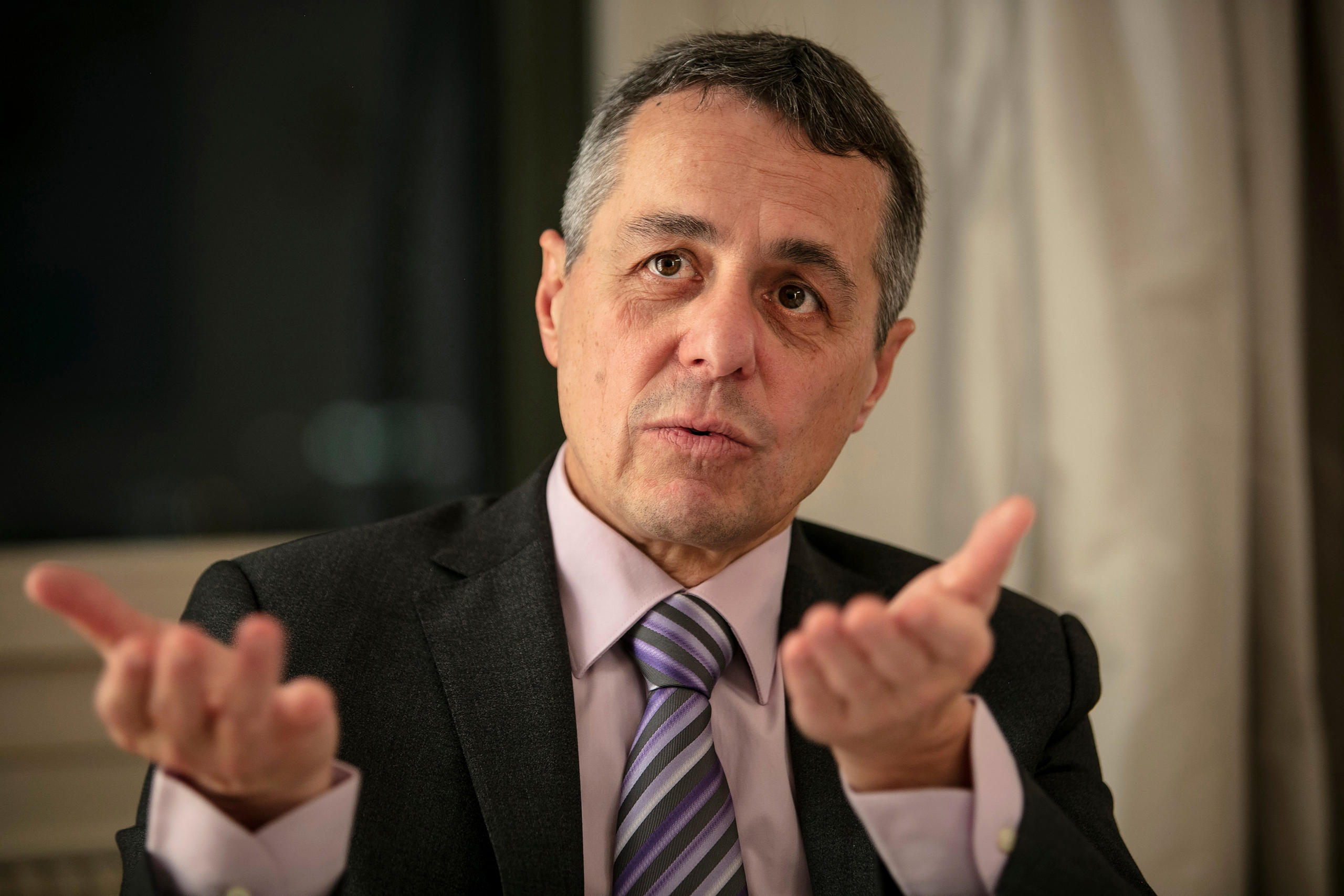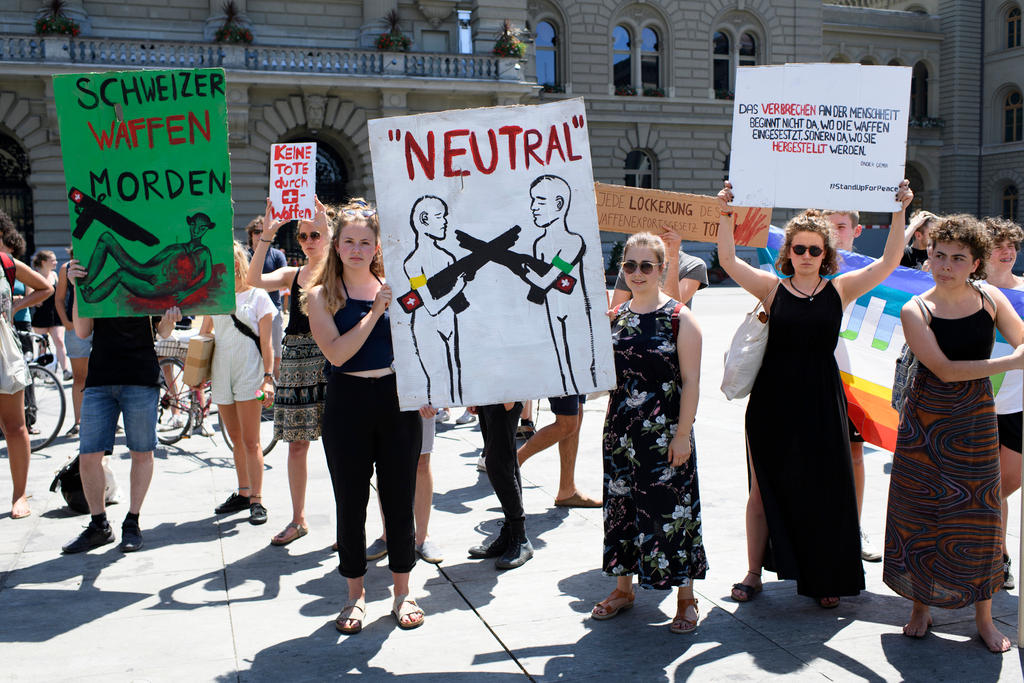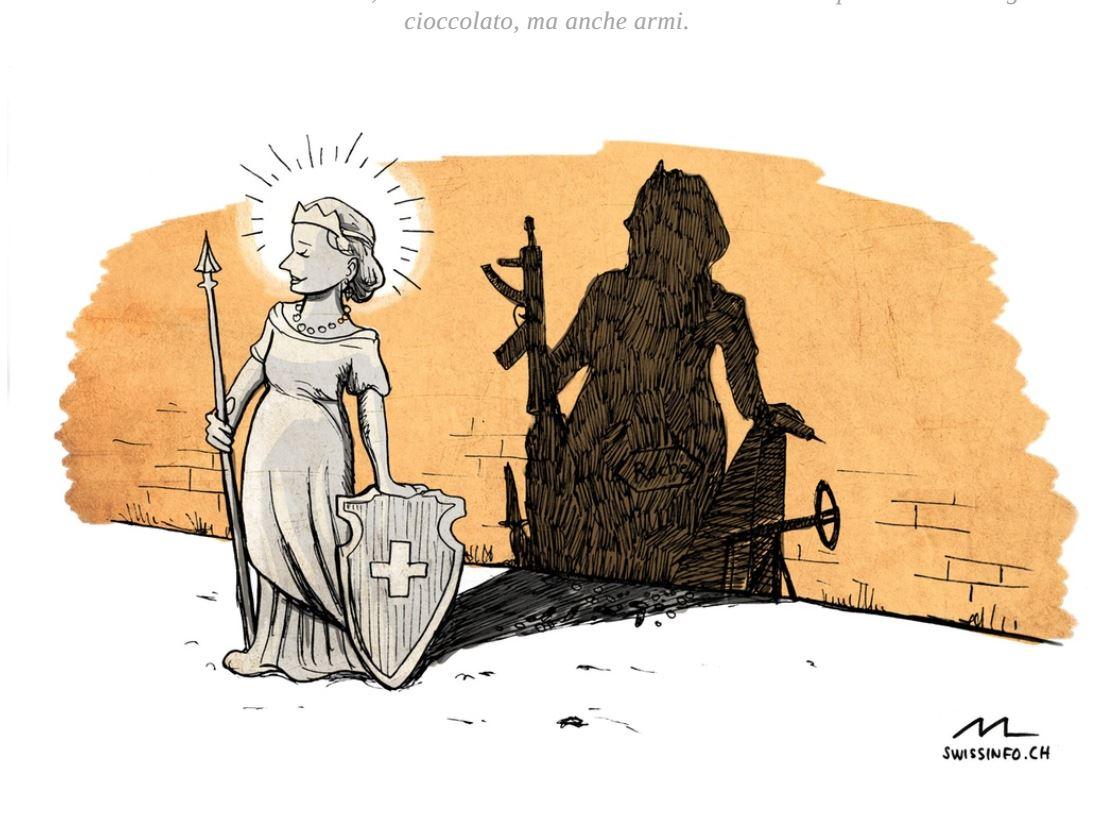‘The more we take democracies for granted, the less prepared we are to defend them’

Switzerland’s foreign minister says defending human rights and democracy building remain at the heart of Switzerland’s agenda, even as the UN Universal Declaration of Human Rights – now 70 years old – has come under pressure internationally.
Ignazio Cassis also spoke to swissinfo.ch about populism, arms exports and Switzerland’s place in the world today.
swissinfo.ch: Do your foreign colleagues often ask you about direct democracy in Switzerland?
Ignazio Cassis: I hardly ever get asked up-front about direct democracy. This is for the simple reason that the term “direct democracy” is not widely known in other countries and societies. However, I often refer to our popular rights when I try to explain the Swiss system
What actually makes the Swiss tick? This is a question we often put to ourselves. I think that every answer involves direct democracy. It’s a cumbersome system that requires a lot of energy. At the same time, directly involving Swiss citizens contributes to solid social, political and economic stability. This is what many in the world envy us for.
swissinfo.ch: Is such a system only possible in Switzerland?
I.C.: We have a good historic base for such a system. We never had kings or emperors, which means we never had absolute concentration of power. However, many nations all over the world are currently trying to find new approaches to better involve their citizens in politics and create a direct democracy system.
Many of these attempts are still in their infancies, such as the European Union’s citizens’ initiative. The Brexit referendum in the United Kingdom is another example, and its implementation continues to be controversial to this day.
The Swiss are used to going to the ballot box to vote on an issue four times per year. On the eve of election Sunday, the situation is clear and the results are usually accepted by everyone involved. This may sound banal, but on a global scale it is anything but.
swissinfo.ch: According to the Swiss constitution, democracy building is a priority of Swiss foreign policy. What does that involve?
I.C.: In foreign policy, this is not always easy, since promoting democracy and human rights is mainly a domestic policy issue in most countries. For this reason, Switzerland focuses on cooperation projectsExternal link aimed at building democracies through decentralisation. Less concentration of power gives the citizens more possibilities to decide and participate in a decision.
This, on the other hand, can only work if apart from political power, the financial sector is also democratised and decentralised.
swissinfo.ch: Can you name a few examples where Switzerland has successfully contributed to democracy building?
I.C.: In Tunisia, for example, we have supported decentralisation measures for the last eight years since the Arab Spring. Through such measures, citizens’ participation is also strengthened.
Our projects also support the promotion of women, as we know from experience that in many countries women are better at managing finances and are more likely to ensure that the basic requirements of the local population are met.
What’s important is that we don’t just export the Swiss model, but share our experience.
swissinfo.ch: This sounds more complicated than a simple recipe for success that you can share with the world as a member of the Swiss government and foreign minister.
I.C.: Of course, we must not overestimate our impact. During a decentralisation process it is also important to take into account the differences and inequalities of the various people or regions.
This is something that really struck me in India. This federally organised country is increasingly wondering how many inequalities a state can take. This is why they are slowly harmonising the tax system. Switzerland has a lot of experience in this field and it is certainly something we can share.
swissinfo.ch: Democracies are not faring particularly well in many parts of the world. Human rights are violated, freedom of the press is limited, elections and popular votes are rigged. Are you worried about these developments?
I.C.: We will always have to fight for freedom proactively! Once we stop, we lose. Paradoxically, the crises many liberal democracies are faced with at the moment have contributed to their successes.
As a doctor, I see an analogy with vaccinations. The better an vaccine works against an illness, the less people are inclined to get vaccinated. They are no longer aware of the risks of getting sick. The more we take democracies for granted, the less prepared we are to defend them.
These days there is a lot of talk about a populist wave. However, we are also experiencing a revival of paternalism rebuffing demands for more co-determination and division of power, but blaming populists for it. This is also part of the reason why our liberal democracy is coming under pressure. That fills me with concern.
swissinfo.ch: In some places, journalists get killed for simply doing their jobs. How do you, as Swiss foreign minister, respond to these violations of human rights?
I.C.: By directly reacting on a political level, by showing public outrage and by implementing concrete measures. Take the case of the murder of the Saudi journalist Jamal Khashoggi, which was a severe violation of human rights. We immediately called for a quick, comprehensive and independent inquiry. This move will most certainly have consequences for our international relationships.
For example, we suspended our exports of spare weapon parts to Saudi Arabia and we drew attention to the human rights situation in Saudi Arabia in political meetings. However, we can’t just cut all ties with Riyadh as Switzerland builds on direct dialogue and has a historic role to play as mediator. We can realise this role with protective power mandates. It would not be the end of the world if Switzerland did not exist, but the world would have yet another problem.
swissinfo.ch: What about domestic and economic interests? When it comes to weapons exports to Saudi Arabia, don’t they compromise our human rights policies?
I.C.: That is correct, and there is a clear conflict of interest. However, due to our history and democracy we are far more reserved in the arms export business than the European Union.
According to our constitution, we have to secure our safety and independence and for this we need a small defence industry. For economic reasons, this industry needs to be able to export goods abroad, but only to countries that are not involved in a conflict.
swissinfo.ch: It was only recently though that the government decided not to relax the guidelines for arms exports. Why not?
I.C.: In this case, the government initially reacted to a proposal by the Senate’s Safety Commission which was concerned about our arms industry. However, when the government submitted a draft law to parliament, it was heavily criticised on humanitarian grounds.
In other words, the division of power prevailing all over Switzerland worked once again. We want to do one thing, but not give up the other even if it’s about controversial issues like in this case.
For every small country, a multilateral system of agreements and conventions is the Alpha and Omega. It is important to apply the power of the law, and not the law of power. Once the law of power prevails, we are no longer in good shape.
International law protects Switzerland. However, this does not mean that it should take over. We simply need it as much as necessary and as little as possible. This is the only way to maintain our independence.
70 years of the UN’s human rights declaration
The Universal Declaration of Human Rights (UDHR) was adopted by the United Nations General Assembly on 10 December 1948. It was designed to prevent a repetition of the human rights violations committed during the Second World War. It was drafted by a diverse group from various countries and is based on the basic premise that all people are “born free and equal in dignity and rights”. It comprises 30 articles, including the right to “direct participation of citizens in the shaping of a country’s public affairs” (Art. 21.1.).
Although the Declaration represents “soft law” – it is not legally binding – it serves as a basis for numerous international and internationally binding agreements. These include the International Covenant on Civil and Political Rights (UN Covenant II) and the European Convention of Human Rights (ECHR).
Based on the Declaration, Switzerland made the promotion of democracy and human rights an integral part of its foreign policy.
To mark the 70th anniversary, the UN High Commissioner for Human Rights Michelle Bachelet declared this week in Geneva that the UDHR remains relevant but warned that progress is “under threat”.
“We need to stand up more energetically for the rights it showed us everyone should have – not just ourselves but all our fellow human beings – and which we are at constant risk of eroding through our own, and our leaders’ forgetfulness, neglect or wanton disregard,” she said.
Adapted from German

In compliance with the JTI standards
More: SWI swissinfo.ch certified by the Journalism Trust Initiative













You can find an overview of ongoing debates with our journalists here . Please join us!
If you want to start a conversation about a topic raised in this article or want to report factual errors, email us at english@swissinfo.ch.